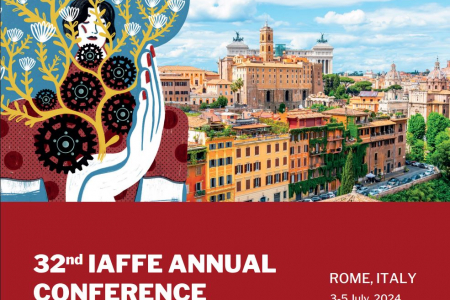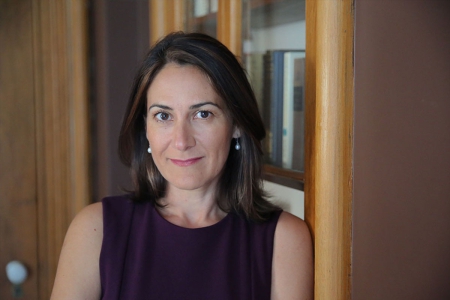Filter by
4182 results found
-
Galbraith and Weber for the Boston Globe: “Harris’s fight on price gouging is good economics”
“The idea that prices serve to balance supply and demand — and should be left free to do so — is bred in the bones of economists. So much so that facts barely matter.” Read Senior Scholar James K. Galbraith and Isabella M. Weber, University of Massachussets–Amherst, in an op-ed for the Boston Globe. They respond to […] -
Levy Scholars Present at Gender Disparities Workshop in Accra, Ghana
Levy Scholars presenting at the workshop include: Senior Scholar Ajit Zacharias: Old-age income (in)security in Ghana and South Africa: trends and prospects Senior Scholar Thomas Masterson: Methodological aspects Research Scholar Aashima Sinha: Introduction to Employment Security: Overview, Indicators and Measures Globalization and the shift to structural adjustment policies in the global south and to supply-side […] -
Tcherneva on Background Briefing with Ian Masters
Levy Institute President Pavlina R. Tcherneva spoke with Ian Masters on his podcast Background Briefing on “Wall Street’s and the Global Drop in Markets Does Not Spell Recession.” Background Briefing with Ian Masters · August 5, 2024 – David Schultz | David Daley | Pavlina Tcherneva -
Event
Racial, Gender, and Regional Inequalities in Brazil’s Care Provision and the Evolving Role of the State
Join us for our first session of the 2024 Fall Semester, with Luiza Nassif Pires, Assistant Professor at the Institute of Economics at Unicamp and the Director of the Research Center on Macroeconomics of Inequalities (MADE) at FEA/USP, on Monday, September 9th, from 5pm to 6pm in the Levy Conference Room at Blithewood, or on […] -

Levy Scholars Present at IAFFE Conference 2024 in Rome
On July 3-5, Senior Scholars Thomas Masterson and Gennaro Zezza and Research Scholars Aashima Sinha and Francesco Zezza presented at the 32nd Annual Conference of the International Association for Feminist Economists (IAFFE) at the Sapienza Universita di Roma in Italy. Masterson presented “The impact of social care provision in Mexico on time and income poverty” (Masterson, Zacharias, […] -

The Levy Institute Welcomes Pavlina R. Tcherneva as Incoming President
The Levy Economics Institute of Bard College welcomes Pavlina R. Tcherneva as its next president, succeeding Dimitri B. Papadimitriou, who has held the role since 1986. “After thirty-eight years as president of the Levy Institute, the time has come to pass the baton to the new generation,” Papadimitriou announced, “I can think of no one […] -
Working Paper No. 1054
Gender-Responsive Public Financial Management: The Indian Chronology of Gender Budgeting
Gender budgeting is a public financial management (PFM) tool, used to ensure accountability mechanisms. The analysis of “process” indicators of gender-responsive PFM (GRPFM) reveals that India has been successful in integrating a gender lens within the budget cycle, including in the financial planning and allocation, and in effective implementation. However, a legally mandated GRPFM would […] -
Working Paper No. 1053
Foreign Deficit and Economic Policy: The Case of Mexico
The article analyzes Mexico under globalization, particularly on the free mobility of capital. It argues that globalization has detrimentally impacted the productive and external sectors, causing the economy to become excessively reliant on volatile capital inflows from abroad. The Mexican government—instead of undoing the structural problems that lead to external deficits—implements policies that resolve the […] -
Working Paper No. 1052
Exchange-Rate Stability Causes Deterioration of the Productive Sphere and Destabilizes Developing Economies
For Matías Vernengo and Esteban Pérez Caldentey (2020), the MMT literature overemphasizes the choice of the exchange rate regime and the relevance of a flexible exchange rate regime, as well as the ultimate effect of that choice upon the policy space. In addition, they argue that the role of capital flows is underexplored, and that […] -
 Strategic Analysis
Strategic AnalysisU.S. Economic Outlook: Prospects for 2024 and Beyond
In this report, Institute President Dimitri B. Papadimitriou, Research Scholar Giuliano T. Yajima, and Senior Scholar Gennaro Zezza discuss the rapid recovery of the US economy in the post-pandemic period. They find that robust consumption and investment and a relaxation of fiscal policy were the key drivers of accelerated GDP growth—however, the signs that the […] -
Working Paper No. 1051
Euro Interest Rate Swap Yields: Some ARDL Models
This paper examines the dynamics of euro-denominated (EUR) long-term interest rate swap yields. It shows that the short-term interest rate has an economically and statistically significant effect on EUR swap yields of different maturity tenors, after controlling for various key macroeconomic variables. It presents several autoregressive distributive lag (ARDL) models of the dynamics of EUR […] -
 One-Pager No. 72
One-Pager No. 72If Government Can Print Money, Why Does It Borrow?
Recently, the neglected question of why the US government borrows, given that it can print money, has arisen in the context of discussions surrounding a new documentary, Finding the Money. As L. Randall Wray observes in this one-pager, Modern Money Theory has been providing answers to this question for some time; and, he argues, it is a topic that mainstream economists are ill-equipped to address, since very few concern themselves with the monetary operations that underlie the question of why a currency-issuing government issues debt.



